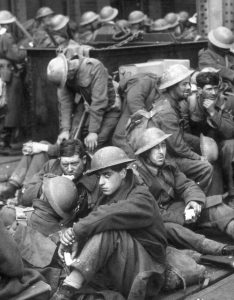 Today, Friday 26th May, marks the 77th anniversary of the beginning of ‘Operation Dynamo’ the code name for the evacuation of the remnants of the British Expeditionary Force (the BEF) from the beaches of Dunkirk, France. The evacuation, which saw more than 200,000 British troops together with another 100,000 troops, mainly French, from other Allied nations, seemed to signal the end of serious resistance to Adolf Hitler’s Germany whose forces had swept all before them in France and the Low Countries. The surrender of France, just a few weeks after the last British forces left the continent, on 22 June 1940, meant that Hitler’s armies had achieved in barely 6 weeks what the armies of the Kaiser had failed to do in four long years between 1914-18.
Today, Friday 26th May, marks the 77th anniversary of the beginning of ‘Operation Dynamo’ the code name for the evacuation of the remnants of the British Expeditionary Force (the BEF) from the beaches of Dunkirk, France. The evacuation, which saw more than 200,000 British troops together with another 100,000 troops, mainly French, from other Allied nations, seemed to signal the end of serious resistance to Adolf Hitler’s Germany whose forces had swept all before them in France and the Low Countries. The surrender of France, just a few weeks after the last British forces left the continent, on 22 June 1940, meant that Hitler’s armies had achieved in barely 6 weeks what the armies of the Kaiser had failed to do in four long years between 1914-18.
Although Operation Dynamo provided the end to a deeply dispiriting campaign for the British and their French Allies, the actual dynamics of the evacuation gave cause for hope, at least in terms of how the evacuation proceeded and the manner in which it was portrayed in Allied propaganda. The Royal Navy successfully kept the evacuation beaches open and the Royal Airforce provided air cover while soldiers were moved across the beaches courtesy of naval and merchant navy vessel but also an improbable armada of ‘little ships’, often civilian owned and frequently civilian crewed vessels that crossed the channel with naval escorts to supplement the military vessels. The courage of these crews helped turn the reality of Dunkirk into a propaganda triumph and helped steel the resolve of the British people for the battle of Britain, yet to be fought, and the blitz that followed.
 George C. Marshall, watching from a distance, would comment, years after during his serious of interviews with Forest Pogue how “that remarkable escape from Dunkirk [was] carried out by the spirit of the people“. The British Army left behind most of its heavy equipment in France meaning that any invasion of Britain by the victorious German forces would have faced spirited resistance but very little in the way of heavy weapons. Marshall also remembered how the U.S. Army spared what it could to help re-equip the British Army commenting however that the “tragedy of the matter was that when they issued these American gifted rifles, they could only give them ten rounds of ammunition, and they went to the people of Great Britain to defend their towns and all when a German invasion was very much threatened. But we hadn’t any ammunition in excess of that to give them, so we did give them ten rounds per gun. So, they couldn’t train for it, but they at least would have a rifle and they at least would have ten shots“.
George C. Marshall, watching from a distance, would comment, years after during his serious of interviews with Forest Pogue how “that remarkable escape from Dunkirk [was] carried out by the spirit of the people“. The British Army left behind most of its heavy equipment in France meaning that any invasion of Britain by the victorious German forces would have faced spirited resistance but very little in the way of heavy weapons. Marshall also remembered how the U.S. Army spared what it could to help re-equip the British Army commenting however that the “tragedy of the matter was that when they issued these American gifted rifles, they could only give them ten rounds of ammunition, and they went to the people of Great Britain to defend their towns and all when a German invasion was very much threatened. But we hadn’t any ammunition in excess of that to give them, so we did give them ten rounds per gun. So, they couldn’t train for it, but they at least would have a rifle and they at least would have ten shots“.
Great Britain of course held on, despite defeat in mainland Europe, and alone amongst European nations successfully resisted the Germans. The French troops evacuated alongside the British would go on to form the nucleus of the Free French forces that accompanied the Americans, British and Canadians four long years later when the allies returned to France on 6th June 1944 with Operation Overlord.
The story of Dunkirk will be told in a new film, out this summer.
